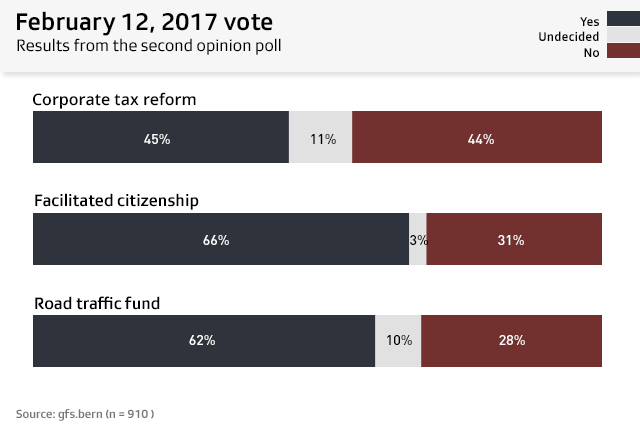Tax reform opponents gain momentum

A major reform of Switzerland’s corporate tax system goes to the vote on February 12 but the result is too close to call, according to a latest poll. Backers of the reform have seen a 15% lead go up in smoke since the previous poll more than three weeks ago.
Supporters now have just a 1% lead – with a 2.7% margin of error – over opponents led by the political left, according to a second and final opinion poll published on Wednesday by the Swiss Broadcasting Corporation (SBC) – swissinfo.ch’s parent company.
“The campaign over the past few weeks mobilised primarily the leftwing grassroots and those critical of the government,” says GfS Bern’s senior political analyst Claude Longchamp.
He said the poll showed that open criticism of the tax reform by a former finance minister, Eveline Widmer-Schlumpf, has had an impact, but it was not the only element to boost the campaign of the opponents.
“She put it in a nutshell,” he says. “It has become a debate about whether the government’s promises are trustworthy.”
Most notably respondents of the middle class and in big cities, including Zurich, Geneva, Basel, Lausanne and Bern, are against the reform, according to pollsters.

Another 11% of respondents in the poll, carried out by the leading GfS Bern research institute, said they were still undecided.
New tax breaks
The reform seeks to put the Swiss corporate tax system in line with the norms of the Organisation for Economic Co-operation and Development (OECD), harmonising fiscal rates for foreign and domestic firms. It will also include new tax breaks on research and development carried out by companies.
Supporters, including the government, parliament and the business community, say the amendment to the law will help attract even more multinational companies to Switzerland.
Opponents argue that taxpayers, and particularly the middle class, will ultimately foot the bill if the strategy fails and leads to a multi-million franc shortfall in revenue, as was the case with a previous corporate tax reform voted on in 2008.
Citizenship vote
Another issue to come to a vote on February 12 is a plan to ease the citizenship procedure under certain conditions for so called third-generation immigrants (with grandparents and parents who have already lived in Switzerland, at least temporarily).
Supporters will be slightly less confident than they were at the end of December, when 74% of respondents said they would approve the constitutional amendment. That figure has now dropped to 66%.
“The opponents have won ground at the expense of the supporters,” says GfS political scientist Martina Mousson. “This is unusual for votes on government proposals, but there is still a firm majority.”
She says the No campaign has been probably more successful in rural regions than in cities.
Pollsters interviewed 1,423 Swiss citizens from all language regions across the country for the second of two nationwide surveys.
Swiss expatriates are not be included in the poll for data protection reasons.
The telephone interviews, both with fixed line (80%) and mobile phone users (20%), took place from January 18-25.
The margin of error is 2.7%.
The survey was commissioned by the SBC, swissinfo’s parent company, and carried out by the leading GfS Bern research and polling institute.
A poster by the rightwing Swiss People’s Party showing a woman wearing a black burka had no clear impact, according to Mousson. “Opinions are clearly divided over it,” she said.
The latest citizenship amendment is seen as a modest version of a proposal that was rejected by voters in 2004. Its aim was to grant Swiss citizenship automatically to third-generation immigrants and it sought to simplify the procedure for second-generation immigrants.
Road funding
A clear majority, 62%, also backs a proposal to re-organise the funding of the country’s motorway network and roads in urban areas. This has increased by two percentage points compared with the first poll.
Pollsters on Wednesday say all indications point to approval of the constitutional amendment.
So far, there’s been little public controversy over the issue and only the Green Party and environmental organisations have come out against the change to the constitution.
The proposal adopted by parliament is seen as a compromise to appease the car lobby which had asked for a massive increase in funds for road transport. The proposal was rejected in a nationwide vote last year.

In compliance with the JTI standards
More: SWI swissinfo.ch certified by the Journalism Trust Initiative












You can find an overview of ongoing debates with our journalists here . Please join us!
If you want to start a conversation about a topic raised in this article or want to report factual errors, email us at english@swissinfo.ch.